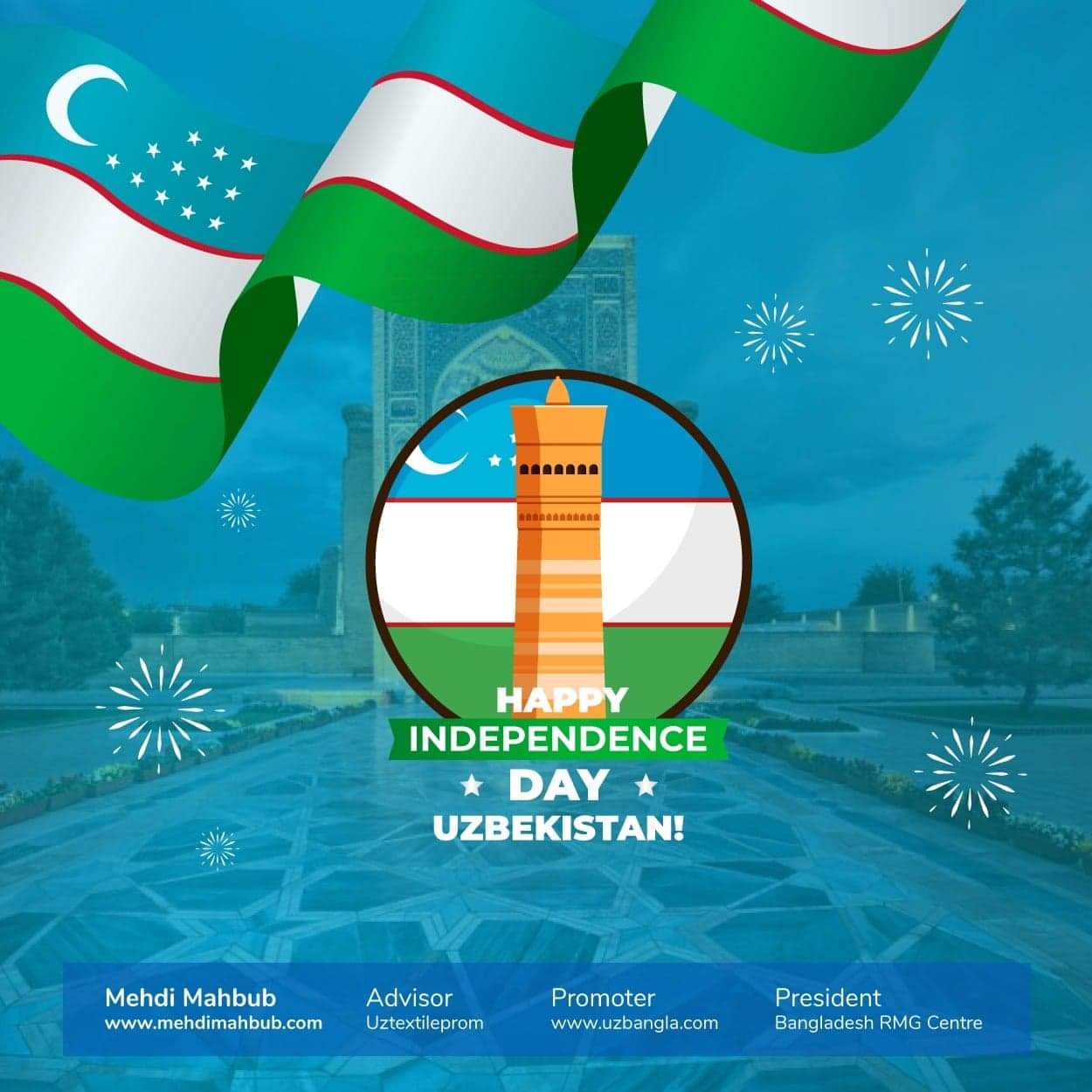It is a great honor for me today, 1st September 2020, to deliver my warmest congratulations to the Uzbek people through Uzbangla with regards to the celebration of the 29th anniversary of the Independence of the Republic of Uzbekistan.
Upon assuming power in 2016, President Shavkat Mirziyoyev began putting in place economic, financial and foreign policy reforms in Uzbekistan. Within a year, world financial and monetary agencies have upgraded sentiments on Uzbekistan. According to the World Bank estimates, its annual GDP growth surpassed 6%. The World Bank has praised Uzbekistan’s rise in Doing Business rankings. For many years, Uzbekistan Textile Industry has suffered for the embargo on its products due to alleged forced labor. Many international brands have stopped using Uzbek cotton. Thanks to successful dialogue between Uzbek government and International Labor Organization as well as other stakeholders, the issue has been resolved and Uzbekistan has started to get its benefits. Foreign Direct Investment (FDI) has been growing in the country due to policy reforms and government initiatives. Foreign investments in the textile industry of Uzbekistan for the last years amounted to $3.1 billion.
On the initiative of the distinguished President Shavkat Mirziyoyev, the Five-Area Development Strategy for 2017-2021 was adopted. This strategy covers all spheres of life of the population of Uzbekistan. As a result of the continuing purposeful work of the President and the Government of Uzbekistan, the country’s image on the world stage began to strengthen rapidly. Uzbekistan is becoming a regional power gradually and confidently.
Both Bangladesh and Uzbekistan have common religious, culinary and historical bondage, thanks to Islam and Mughal Empire. Art and Culture also have strong relationship, bridging between Uzbekistan and Bangladesh. Imam Bukhari, Ibne Sina, Babur do have special impact on Bangladeshis mindsets. Great Warrior Timur has a very special place in every Uzbek’s mind, the way Bangladesh’s Father of The Nation, Bangabandhu won the highest position in Bangladesh society. Uzbek’s national cuisine pilaf is also a very popular cuisine in Bangladesh, being called as polao!
As the largest market in Central Asia with a population of 34 million, Uzbekistan is an industrial hub for organizing production and entering the 300 million markets of the CIS countries and Afghanistan. Uzbekistan is located at the centre of central Asia, with convenient connections to Middle East, Russia and Europe. Both countries’ national airlines could explore opportunity to connect each other’s capitals and thus help a large number of passengers and cargo to be connected, transported globally. Bangladesh Biman can touch down Tashkent on the way to its flight to London, Manchester; even Biman’s flights to Middle East can be re-routed little to accommodate stoppage in Tashkent.
It is also underscored that Bangladesh has potentials to export medicine, leather products, tea, jute products, garments etc to Uzbekistan and its neighboring countries. Uzbek industries also can explore Bangladesh, specially in the areas of textile products. Using Uzbek raw materials (cotton, yarn, fruits etc), Uzbek companies can establish factories in Bangladesh’s EPZs (Export Processing Zones) and SEZs (Special Economic Zones) which can be exported to world markets.
Bangladesh has received world’s accolade and appreciation because of its success in GDP growth as well as improvements in HDI, thanks to immunization, literacy & nutrition campaign, child mortality etc in addition to tremendous growth in food & fish production, digitalization/ IT, technical skill development, SME & service sector growth etc. Uzbekistan can learn these success stories working with government as well as private sectors/ NGOs from Bangladesh.
On this important day for Uzbekistan, as the Advisor to Uztextileprom (Uzbekistan Textile Association/ Ministry) and President of Bangladesh RMG Centre, I want to wish all the people and the leadership of the Republic of Uzbekistan prosperity and well-being.







